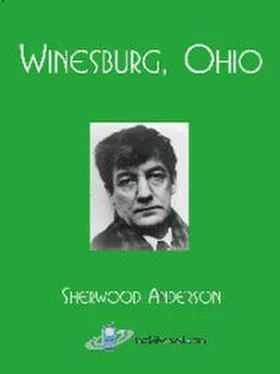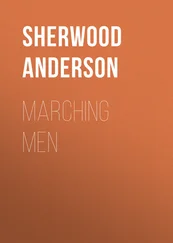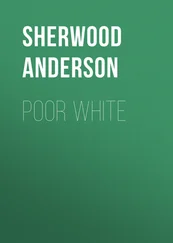Sherwood Anderson - Winesburg, Ohio
Здесь есть возможность читать онлайн «Sherwood Anderson - Winesburg, Ohio» весь текст электронной книги совершенно бесплатно (целиком полную версию без сокращений). В некоторых случаях можно слушать аудио, скачать через торрент в формате fb2 и присутствует краткое содержание. Жанр: Старинная литература, на английском языке. Описание произведения, (предисловие) а так же отзывы посетителей доступны на портале библиотеки ЛибКат.
- Название:Winesburg, Ohio
- Автор:
- Жанр:
- Год:неизвестен
- ISBN:нет данных
- Рейтинг книги:3 / 5. Голосов: 1
-
Избранное:Добавить в избранное
- Отзывы:
-
Ваша оценка:
- 60
- 1
- 2
- 3
- 4
- 5
Winesburg, Ohio: краткое содержание, описание и аннотация
Предлагаем к чтению аннотацию, описание, краткое содержание или предисловие (зависит от того, что написал сам автор книги «Winesburg, Ohio»). Если вы не нашли необходимую информацию о книге — напишите в комментариях, мы постараемся отыскать её.
Winesburg, Ohio — читать онлайн бесплатно полную книгу (весь текст) целиком
Ниже представлен текст книги, разбитый по страницам. Система сохранения места последней прочитанной страницы, позволяет с удобством читать онлайн бесплатно книгу «Winesburg, Ohio», без необходимости каждый раз заново искать на чём Вы остановились. Поставьте закладку, и сможете в любой момент перейти на страницу, на которой закончили чтение.
Интервал:
Закладка:
* * *
Elizabeth died one day in March in the year when her son George became eighteen, and the young man had but little sense of the meaning of her death. Only time could give him that. For a month he had seen her lying white and still and speechless in her bed, and then one afternoon the doctor stopped him in the hallway and said a few words.
The young man went into his own room and closed the door. He had a queer empty feeling in the region of his stomach. For a moment he sat staring at, the floor and then jumping up went for a walk. Along the station platform he went, and around through residence streets past the high-school building, thinking almost entirely of his own affairs. The notion of death could not get hold of him and he was in fact a little annoyed that his mother had died on that day. He had just received a note from Helen White, the daughter of the town banker, in answer to one from him. "Tonight I could have gone to see her and now it will have to be put off," he thought half angrily.
Elizabeth died on a Friday afternoon at three o'clock. It had been cold and rainy in the morning but in the afternoon the sun came out. Before she died she lay paralyzed for six days unable to speak or move and with only her mind and her eyes alive. For three of the six days she struggled, thinking of her boy, trying to say some few words in regard to his future, and in her eyes there was an appeal so touching that all who saw it kept the memory of the dying woman in their minds for years. Even Tom Willard, who had always half resented his wife, forgot his resentment and the tears ran out of his eyes and lodged in his mustache. The mustache had begun to turn grey and Tom colored it with dye. There was oil in the preparation he used for the purpose and the tears, catching in the mustache and being brushed away by his hand, formed a fine mist-like vapor. In his grief Tom Willard's face looked like the face of a little dog that has been out a long time in bitter weather.
George came home along Main Street at dark on the day of his mother's death and, after going to his own room to brush his hair and clothes, went along the hallway and into the room where the body lay. There was a candle on the dressing table by the door and Doctor Reefy sat in a chair by the bed. The doctor arose and started to go out. He put out his hand as though to greet the younger man and then awkwardly drew it back again. The air of the room was heavy with the presence of the two self-conscious human beings, and the man hurried away.
The dead woman's son sat down in a chair and looked at the floor. He again thought of his own affairs and definitely decided he would make a change in his life, that he would leave Winesburg. "I will go to some city. Perhaps I can get a job on some newspaper," he thought, and then his mind turned to the girl with whom he was to have spent this evening and again he was half angry at the turn of events that had prevented his going to her.
In the dimly lighted room with the dead woman the young man began to have thoughts. His mind played with thoughts of life as his mother's mind had played with the thought of death. He closed his eyes and imagined that the red young lips of Helen White touched his own lips. His body trembled and his hands shook. And then something happened. The boy sprang to his feet and stood stiffly. He looked at the figure of the dead woman under the sheets and shame for his thoughts swept over him so that he began to weep. A new notion came into his mind and he turned and looked guiltily about as though afraid he would be observed.
George Willard became possessed of a madness to lift the sheet from the body of his mother and look at her face. The thought that had come into his mind gripped him terribly. He became convinced that not his mother but someone else lay in the bed before him. The conviction was so real that it was almost unbearable. The body under the sheets was long and in death looked young and graceful. To the boy, held by some strange fancy, it was unspeakably lovely. The feeling that the body before him was alive, that in another moment a lovely woman would spring out of the bed and confront him, became so overpowering that he could not bear the suspense. Again and again he put out his hand. Once he touched and half lifted the white sheet that covered her, but his courage failed and he, like Doctor Reefy, turned and went out of the room. In the hallway outside the door he stopped and trembled so that he had to put a hand against the wall to support himself. "That's not my mother. That's not my mother in there," he whispered to himself and again his body shook with fright and uncertainty. When Aunt Elizabeth Swift, who had come to watch over the body, came out of an adjoining room he put his hand into hers and began to sob, shaking his head from side to side, half blind with grief. "My mother is dead," he said, and then forgetting the woman he turned and stared at the door through which he had just come. "The dear, the dear, oh the lovely dear," the boy, urged by some impulse outside himself, muttered aloud.
As for the eight hundred dollars the dead woman had kept hidden so long and that was to give George Willard his start in the city, it lay in the tin box behind the plaster by the foot of his mother's bed. Elizabeth had put it there a week after her marriage, breaking the plaster away with a stick. Then she got one of the workmen her husband was at that time employing about the hotel to mend the wall. "I jammed the corner of the bed against it," she had explained to her husband, unable at the moment to give up her dream of release, the release that after all came to her but twice in her life, in the moments when her lovers Death and Doctor Reefy held her in their arms.
Sophistication
It was early evening of a day in, the late fall and the Winesburg County Fair had brought crowds of country people into town. The day had been clear and the night came on warm and pleasant. On the Trunion Pike, where the road after it left town stretched away between berry fields now covered with dry brown leaves, the dust from passing wagons arose in clouds. Children, curled into little balls, slept on the straw scattered on wagon beds. Their hair was full of dust and their fingers black and sticky. The dust rolled away over the fields and the departing sun set it ablaze with colors.
In the main street of Winesburg crowds filled the stores and the sidewalks. Night came on, horses whinnied, the clerks in the stores ran madly about, children became lost and cried lustily, an American town worked terribly at the task of amusing itself.
Pushing his way through the crowds in Main Street, young George Willard concealed himself in the stairway leading to Doctor Reefy's office and looked at the people. With feverish eyes he watched the faces drifting past under the store lights. Thoughts kept coming into his head and he did not want to think. He stamped impatiently on the wooden steps and looked sharply about. "Well, is she going to stay with him all day? Have I done all this waiting for nothing?" he muttered.
George Willard, the Ohio village boy, was fast growing into manhood and new thoughts had been coming into his mind. All that day, amid the jam of people at the Fair, he had gone about feeling lonely. He was about to leave Winesburg to go away to some city where he hoped to get work on a city newspaper and he felt grown up. The mood that had taken possession of him was a thing known to men and unknown to boys. He felt old and a little tired. Memories awoke in him. To his mind his new sense of maturity set him apart, made of him a half-tragic figure. He wanted someone to understand the feeling that had taken possession of him after his mother's death.
There is a time in the life of every boy when he for the first time takes the backward view of life. Perhaps that is the moment when he crosses the line into manhood. The boy is walking through the street of his town. He is thinking of the future and of the figure he will cut in the world. Ambitions and regrets awake within him. Suddenly something happens; he stops under a tree and waits as for a voice calling his name. Ghosts of old things creep into his consciousness; the voices outside of himself whisper a message concerning the limitations of life. From being quite sure of himself and his future he becomes not at all sure. If he be an imaginative boy a door is torn open and for the first time he looks out upon the world, seeing, as though they marched in procession before him, the countless figures of men who before his time have come out of nothingness into the world, lived their lives and again disappeared into nothingness. The sadness of sophistication has come to the boy. With a little gasp he sees himself as merely a leaf blown by the wind through the streets of his village. He knows that in spite of all the stout talk of his fellows he must live and die in uncertainty, a thing blown by the winds, a thing destined like corn to wilt in the sun. He shivers and looks eagerly about. The eighteen years he has lived seem but a moment, a breathing space in the long march of humanity. Already he hears death calling. With all his heart he wants to come close to some other human, touch someone with his hands, be touched by the hand of another. If he prefers that the other be a woman, that is because he believes that a woman will be gentle, that she will understand. He wants, most of all, understanding.
Читать дальшеИнтервал:
Закладка:
Похожие книги на «Winesburg, Ohio»
Представляем Вашему вниманию похожие книги на «Winesburg, Ohio» списком для выбора. Мы отобрали схожую по названию и смыслу литературу в надежде предоставить читателям больше вариантов отыскать новые, интересные, ещё непрочитанные произведения.
Обсуждение, отзывы о книге «Winesburg, Ohio» и просто собственные мнения читателей. Оставьте ваши комментарии, напишите, что Вы думаете о произведении, его смысле или главных героях. Укажите что конкретно понравилось, а что нет, и почему Вы так считаете.












